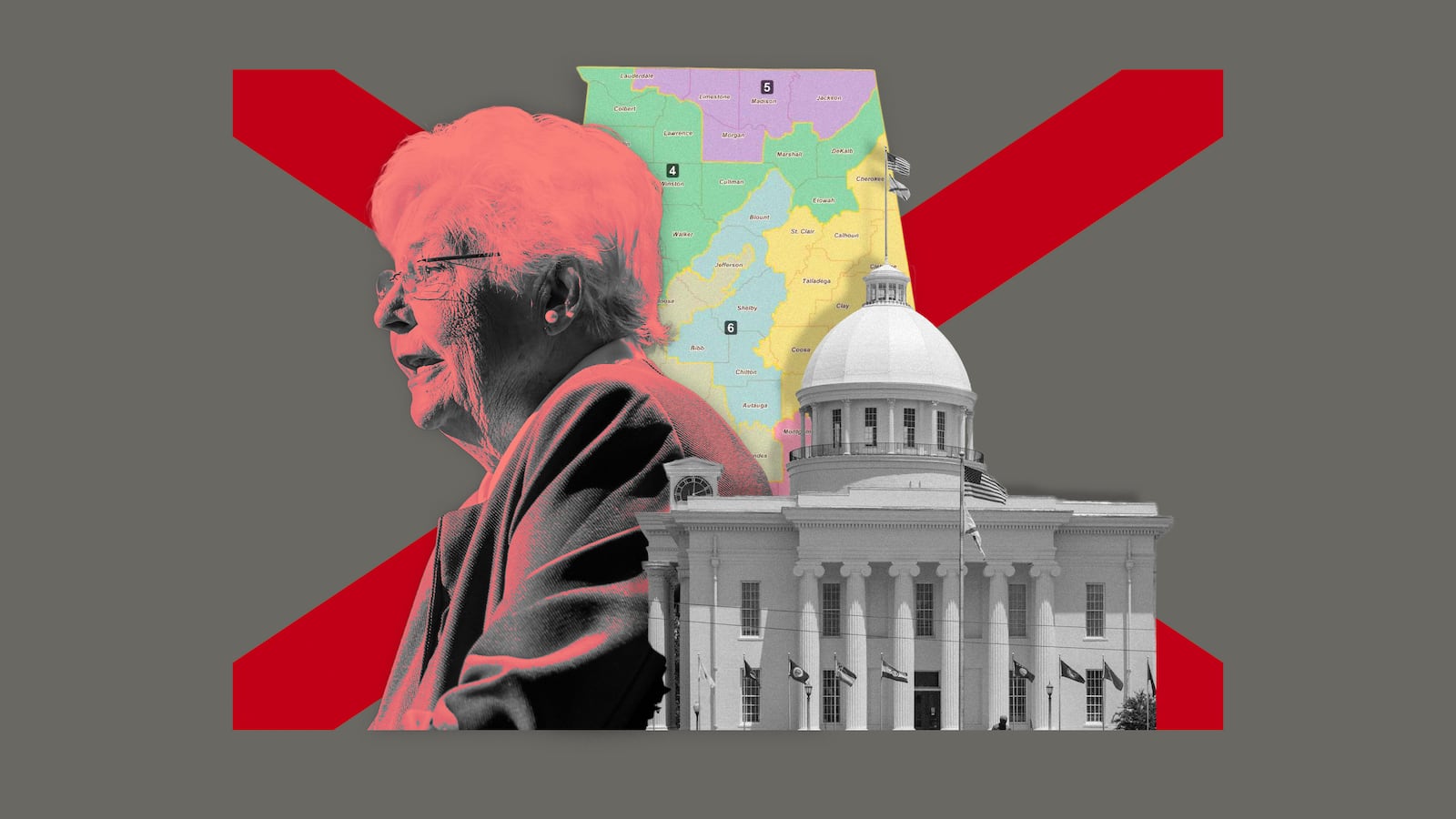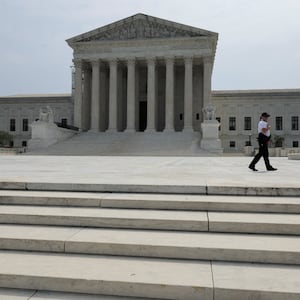Late last week, the state of Alabama appeared to defy the United States Supreme Court by refusing to redraw its congressional districts as ordered by the Court.
The immediate aftermath of Alabama’s conduct has been predictable: continued litigation, political grandstanding, and revisiting that state’s history of racial discrimination at the ballot box. But the significance of what is happening in Alabama goes beyond redistricting and voting rights: it represents an extremely dangerous step away from American democracy.
In 1870, the United States ratified the 15th Amendment, which says that the right of citizens to vote “shall not be denied or abridged by the United States or by any State on account of race, color, or previous condition of servitude.”
For nearly 100 years, however, the 15th Amendment proved to be barely more than what Supreme Court Chief Justice John Roberts recently described as a “parchment promise”—with Jim Crow laws including poll taxes, literacy tests, and so-called “good-morals requirements” effectively nullifying the Amendment’s intent.
In 1965, to fulfill the promise of the 15th Amendment, Congress passed the landmark Voting Rights Act, hailed as one of the most important laws in American history. But not surprisingly, it did not completely “rid the country of racial discrimination in voting,” as intended.
In 1980, the Supreme Court held that the Section 2 of the VRA, which mirrored the language of the 15th Amendment, prohibited voting laws intended to discriminate. That decision led to policy arguments about how to protect against laws that had a discriminatory impact (even without a discriminatory intent) without requiring racial proportionality in election outcomes.

Lead counsel for the plaintiffs Deuel Ross speaks to members of the press as President and Director-Counsel of the NAACP Legal Defense Fund Janai Nelson (R), plaintiff Evan Milligan (2nd R) and Rep. Terri Sewell (D-AL) listen after the oral argument of the Merrill v. Milligan case at the U.S. Supreme Court on Oct. 4, 2022 in Washington, DC.
Alex Wong/Getty ImagesIn 1982, Sen. Bob Dole (R-KS) led a bipartisan effort, signed into law by President Ronald Reagan, that amended the VRA to prohibit any law “which results in” a denial or abridgement of voting rights—expanding it to cover discriminatory impact—but expressly provided that no group is entitled to representation equal to their proportion of the population. The revised VRA also established a “totality of the circumstances” test to ensure meaningful participation in the electoral process, and for the past 41 years, the Supreme Court has consistently interpreted and applied that law.
From a 50,000-foot perspective, the history of the VRA has been an example of our democracy functioning as intended: Congress passes laws; states follow laws; courts correct states not following laws.
Separation of powers? Checks and balances? Protecting Constitutional freedoms? Check, check, and check.
But something is rotten in the state of Alabama.
After the 2020 census, Alabama redrew its seven congressional districts, leading to lawsuits alleging that the new map ran afoul of the VRA through racial gerrymandering that diluted the vote of Black citizens.
In Jan. 2022, after an extensive fact-specific hearing, a three-judge panel in federal court in Alabama found that the new map violated the VRA by denying Black voters an equal opportunity to other Alabamians to elect representatives of their choice. The court ordered Alabama to redraw its map to give Black voters, who represent 27 percent of the population, a meaningful influence in at least two of the seven districts, such as by having two majority-Black districts (the unconstitutional map had one).
Alabama appealed, and the case ultimately went to the U.S. Supreme Court.
Last month in a 5-4 decision written by Chief Justice Roberts and joined by Justices Kavanaugh, Sotomayor, Kagan, and Jackson—SCOTUS affirmed the lower court’s decision.
Last Friday, in what appears to be a direct violation of the Supreme Court’s order, the Alabama Legislature adopted a new map that increases the percentage of Black voters in a second congressional district but failed to create a second majority-Black district or give them materially more influence in that district.
Ultimately, a court will determine whether the legislature complied with the Supreme Court’s order, but comments from Alabama officials suggest they know they did not. The Alabama House speaker pro tempore called it “the best map we could negotiate” with Republicans in the state Senate, and the Alabama Senate President Pro Tem said he believed it was a “fair solution.” Gov. Kay Ivey, who signed the bill into law, defiantly declared, “The Legislature knows our state, our people, and our districts better than the federal courts or activist groups.”
Eric Holder, former U.S. Attorney General and Chair of the National Democratic Redistricting Committee, said Alabama’s new map “arrogantly defies a very conservative United States Supreme Court decision” and “would make [former segregationist Alabama Gov.] George Wallace proud.”
Alabama’s actions are not just arrogant; they are possibly criminal—federal law criminalizes willful disobedience of a court order as contempt.
And they are definitely hypocritical.
Imagine, for example, the Republican outrage if local Democratic election officials half-heartedly enforced the Alabama law requiring voters to have a photo ID in addition to their registration card, saying they tried their best, or it was a fair solution, or that they know their voters better than the legislators from around the state who passed the law.
Above all, Alabama’s defiance is toxic to democracy. As James Madison wrote in Federalist Paper No. 51, “you must first enable the government to control the governed; and in the next place oblige it to control itself.” That is why the Constitution expressly says that it is the supreme law of the land and why since 1803 the courts have exercised judicial review—the authority of federal courts to invalidate unconstitutional acts by other branches of government.

Sadie Janes shows off her voting sticker after casting her ballot at Floyd Middle Magnet School during the Democratic presidential primary in Montgomery, Alabama on Super Tuesday, March 3, 2020.
Joshua LottThis is not Alabama’s first rodeo defying the Supreme Court.
In 1963, Gov. Wallace infamously stood in the entrance of the University of Alabama auditorium to prevent two Black students from registering for school following the Supreme Court’s Brown v. Board of Education decision. Deputy Attorney General Nicholas Katzenbach, flanked by federal marshals, confronted Wallace, who refused to follow the Court’s order. President John F. Kennedy federalized the Alabama National Guard, and a Guard general ordered Wallace to move.
A more recent example is Roy Moore, the former Alabama Supreme Court Chief Justice who unsuccessfully ran for the U.S. Senate amidst evidence that he committed sexual assault by dating underage girls when he was in his thirties. Moore was twice removed from his job as chief justice for defying the U.S. Supreme Court—once for ignoring an order to remove a massive statue of the Ten Commandments from the Alabama courthouse, and again for instructing judges to ignore the SCOTUS decision permitting gay marriage.
Similarly, Gov. Ivey clearly believes that she and her colleagues in the legislature understand better than the U.S. Supreme Court what is best for Alabama. Perhaps so, but they obviously do not understand the basics of our Constitution or founding values.
Recent history has shown us that the stability of our democracy is precariously balanced on our unwavering commitment to the rule of law.
In the last few years we have witnessed unprecedented verbal attacks on democratic institutions, seditious election denial conspiracies, calls for secession, and a physical attack on our house of government.
We need leaders who revere the Constitution—who are willing to uphold laws that they may oppose to protect the freedoms of those with whom they may disagree. Alabama’s choice to do the opposite will not be the end of our republic—and likely will not even require calling up the National Guard—but it is the latest tremor under the foundation of our democracy. And although it may be on brand for Alabama, it is entirely un-American.









